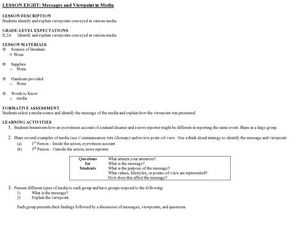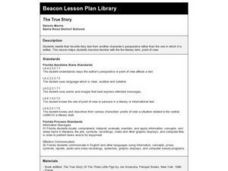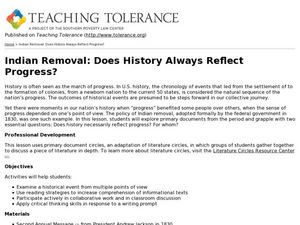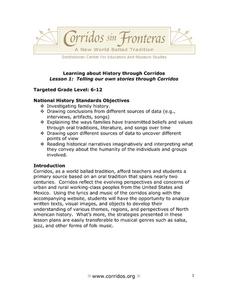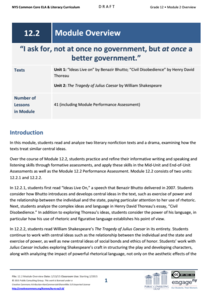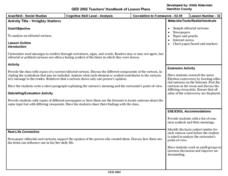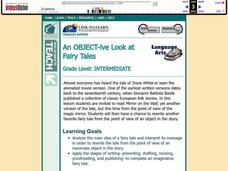Curated OER
Determining Author's Point of View: The Sneeches
Determine the author's point of view in a text. Young readers read Dr. Seuss' The Sneeches and identify the author's purpose in the story. They identify persuasive techniques in writing, asking and answering questions to better...
Curated OER
Elements of Fiction
The metaphor of a pot of soup and a series of colorful templates remind young writers of the elements that make for a rich story. Pepper the plot with carrot/character, potato/point of view, corn/conflict, tomato/theme, and season with...
Curated OER
Messages and Viewpoint in Media
Explore media point of view. In this literacy and current events lesson, pupils identify examples of first and third person point of view in media articles. They analyze examples of media, interpret the messages, and determine purposes...
Curated OER
Recognizing a Message's Point of View
Students study the physical, mental, and social health benefits of regular exercise while attempting to recognize the point of view of media messages. They read an article and discern ways in which they can make regular exercise a part...
Curated OER
Comprehension Questions: The City of Ember, Chapter 20
Comprehension questions for the last chapter of Jeanne DuPrau's book The City of Ember assess factual recall, sequencing skills, and inference about the text. Note: One question about point of view is based on a sentence not related to...
Curated OER
The True Story
What's your favorite fairy tale? Seventh graders rewrite their favorite fairy tale from another character's perspective rather than the one in which it is written. This lesson helps readers become familiar with the literary term point of...
Curated OER
Where are your borders?
Students explore the meaning of borders, both real and symbolic. After viewing film footage and visiting poetry websites, they develop their own point of view. To express their perspective, they are to write a journalism poem, or...
Curated OER
The Metamorphosis: Concept/Vocabulary Analysis
Historically, Franz Kafka's The Metamorphosis has been difficult for many readers to grasp. From the difficult translation issues to the complex plot and themes, the novel's message and story can be lost when learners...
Curated OER
Wisdom of the Ages
Learners reflect on the different stages of life that humans pass through. They challenge common sense assumptions and critically engage media representations of people at different ages. They determine that media have embedded values...
Curated OER
Ad Busting
Debunk advertising myths by creating an opposing image. First, find an ad with a persuasive and emotional pull. Once you have identified the message, create a counter-advertisement that shows the opposite message. For example, if an ad...
Curated OER
Indian Removal: Does History Always Reflect progress?
Students explore the idea that progress for some might not mean progress for all. In this Native American lesson, students recognize different viewpoints about historical events through the study of primary documents. Students decipher...
Curated OER
Passing Down Family History Through Oral Tradition: Corridos
Students create and perform Corridos which are oral tradition ballads. In this Passing Down Family History Through Oral Tradition lesson, students interview family members using a predetermined list of questions. In addition, students...
EngageNY
Connecting Ideas in Primary and Secondary Sources: What Led to the Attack on Pearl Harbor?
Let's make some sense of those thoughts! Scholars continue thinking about the different perspectives on Pearl Harbor. They analyze quotes from War in the Pacific, Day of Infamy, and Fourteen-Part Message. Readers tape each quote to chart...
EngageNY
Studying Conflicting Information: Varying Perspectives on the Pearl Harbor Attack, Part 2
Scholars take another look at Japan's Fourteen-Part Message. They then take turns adding ideas to sentence starters to create ideas about the different perspectives of government. To finish, groups mix and mingle to share their sentences...
EngageNY
Grade 12 ELA Module 2
The second module in a series for high school seniors focuses on tracking the central idea of a text across genres and from multiple author and character perspectives. Twelfth graders read a speech by Benazir Bhutto entitled "Ideas Live...
Curated OER
What's Missing? Making Room for Multiple Perspectives
Students identify missing characters from a text, particularly a school text. They increase critical thinking by supplying missing perspectives in a text an build empathy through surveying different points of view. They reflect on the...
Benjamin Franklin Tercentenary
From Ben’s Pen to Our Lives
What would Ben do? Jumping off from the pseudonymous letters Ben Franklin fooled his older brother into publishing when he was still a teenager, young literary lovers dive into acting, writing, and addressing a local issue with wit and...
Curated OER
Message in a Bottle
Students read acts from The Tempest and complete analysis activities for the play. In this Shakespeare lesson, students read the first four acts of The Tempest and choose one of the characters to write a rescue message from their point...
Curated OER
Rockin’ the World: Rock and Roll and Social Protest in 20th Century America
Young scholars explore protest songs. In this interdisciplinary lesson plan, students examine issues-based music by summarizing lyrics and revealing inferences, generalizations, conclusions, and points of view found in the songs.
Curated OER
Weighty Matters
Learners analyze political cartoons, and write short paragraphs explaining the cartoon's meaning and the cartoonist's point-of-view.
Curated OER
Lesson 1: The Image of Maine in Sinclair Lewis' Babbitt
Students study excerpts from Sinclair Lewis, "Babbitt" for its accuracy and socio-economic point of view. They rewrite a portion of "Babbit" using the point of view of a Maine guide.
Curated OER
Fairy Tales
Students explore fairy tales. In this fairy tales lesson, students analyze the main idea of a fairy tale and interpret it. Students then re-write the story from the point of view of another character or object in the story.
Curated OER
Bronte and Rhys' Portrayal of Bertha
Students, while reading and discussing the two texts by Charlotte Bronte and Jean Rhys, compare/contrast the two main characters and juxtapose them as the same character told from two different points of view. They gain insight of how to...
Curated OER
Yankee Doodle... More than Just a Catchy Tune
Students investigate the history of patriotic music and practice singing the tunes with classmates. In this U.S. History activity, students examine lyrics of the traditional song "Yankee Doodle Dandy" and discuss the differing...


